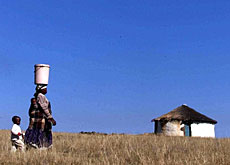
Non-believers could be tapped to help the poor

The centre-right Christian Democratic Party has called for people who don’t pay church tax to make a contribution to international development aid instead.
But critics disagree with the plan, saying that it is too simplistic and is unfair to those who don’t belong to a recognised religion.
In Switzerland, churches of the state recognised religions – Catholic and Protestant – are financially supported by the cantons. This takes the form of a tax which is levied after the payer declares his or her religious affiliation on their tax form.
In cases where the taxpayer declares no religion, a stipend is not usually paid.
But under radical new proposals, the Christian Democrats not only want to use some of the church tax for aid in poorer countries, but also want to tap the taxpayer who doesn’t declare a church affiliation on his or her tax form.
They say the move would help the government reach its stated goal of increasing spending on development aid to 0.4 per cent of gross domestic product (GDP), the amount recommended by the United Nations.
Last year, the government aid budget was 0.38 per cent of GDP, and that may shrink further as result of planned spending cuts.
Christian Democrat Rosemarie Zapfl said that the proposal was “absolutely sincere, because we need new ideas, particularly in view of government cutbacks”.
But she added that it could take some time before the plan is put into action.
Little sense
But the proposal makes little sense to Florence Gerber, from the non-governmental organisation, the Berne Declaration.
Gerber said funding development aid was the responsibility of the state. And despite the fact that some funding would come from the church tax, putting a specific levy on taxpayers who haven’t declared a religious affiliation is inappropriate, she added.
“It’s too simplistic,” said Gerber. “It suggests that people who pay a church tax have already given enough support to development aid, and that others haven’t.”
But the Christian Democrats insist that the plan is fair. Party member Christophe Darbellay says the contribution from both church tax and those who don’t declare a religious affiliation should be the same.
Darbellay added that the contributions would be used to fund health, social or cultural projects, overseen by development aid agencies like the Swiss Agency for Development and Cooperation.
swissinfo with agencies
In 2003 Switzerland spent 17.3 billion on development aid.
This accounts for 0.38 per cent of its Gross Domestic Product (GDP).
The government’s objective is to devote 0.4 per cent of GDP to development aid.
Church tax accounts for about eight per cent of taxpayers’ cantonal tax bills.
Taxpayers pay taxes to their community, canton and federal government.
The church tax is levied to cover church expenses and varies from canton to canton.
The church tax usually only goes to the state recognised Catholic and Protestant denominations.

In compliance with the JTI standards
More: SWI swissinfo.ch certified by the Journalism Trust Initiative




























You can find an overview of ongoing debates with our journalists here . Please join us!
If you want to start a conversation about a topic raised in this article or want to report factual errors, email us at english@swissinfo.ch.